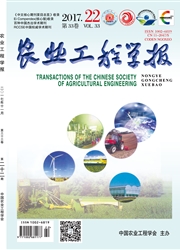

 中文摘要:
中文摘要:
土壤流失方程是开展水土流失监测,指导水土流失防治的重要技术工具。针对红壤坡地土壤流失方程因子算法和取值研究薄弱的问题,基于野外径流小区观测资料,采用80%经验频率法确定了赣北红壤区侵蚀性降雨标准为降雨量10.0 mm、平均雨强1.3 mm/h、最大30 min雨强5.0 mm/h,区内次降雨侵蚀力采用总动能和最大30 min雨强乘积计算最佳。通过建立基于年降雨量的逐年侵蚀力简易算式,测算土壤可蚀性因子以及6种生物措施因子、5种工程措施因子取值,选定适宜的地形因子算式,构建了赣北红壤坡地土壤流失方程体系。经检验,模型能良好预报赣北红壤坡地多年平均土壤侵蚀强度;年际尺度预报的精度整体较高,但对于降雨较多年平均水平浮动较大或地表出现沟蚀等侵蚀类型时,预报精度将有所降低。有关因子的确定可为土壤流失方程在南方红壤坡地水土流失监测和水土保持规划中的应用提供技术支撑。
 英文摘要:
英文摘要:
A soil loss equation is an important technique for monitoring and preventing soil erosion. Based on field observation data from runoff plots, standards on erosive rainfall in red-soil slop land located in northern Jiangxi province were defined by using the method of 80% experience frequency. Results showed that the rainfall amount, average rainfall intensity, and break point intensity of 30 minutes of erosive rainfall standards were 10.0mm, 1.3 mm/h, and 5.0 mm/h, respectively. The best result of individual rainfall erosion was calculated through the product of the total rainfall energy and the break point intensity of 30 minutes. The soil loss equation of the red-soil slop land in northern Jiangxi province was established based on building annual rainfall erosion regression models, selecting the topographic factor algorithm, measuring the value of the soil erodibility factor,and calculating the factor values of six biological measures and five engineering measures factors. The mean relative error(MRE), linear regression coefficient(R2), and the Nash-Suttclife efficiency coefficient(Ens), were used in the simulation results evaluation. Upon testing, when preventing annual average erosion intensity, the MRE, R2 and Ens were 5.48%, 0.99, and 0.99 for the simulation values of the soil loss equation and the observed values. When preventing inter-annual average erosion intensity, the R2and Ens were 0.95 and 0.89. The results suggested that the equation can be used to predict annual average and inter-annual average soil erosion intensity precisely. However, its predicting accuracy is reduced while rainfall significantly deviates from multi-year mean level or gully erosion and other types occur on slope land. All of these can provide technological support for the monitoring and planning of water and soil conservation in the southern red-soil area.
 同期刊论文项目
同期刊论文项目
 同项目期刊论文
同项目期刊论文
 期刊信息
期刊信息
